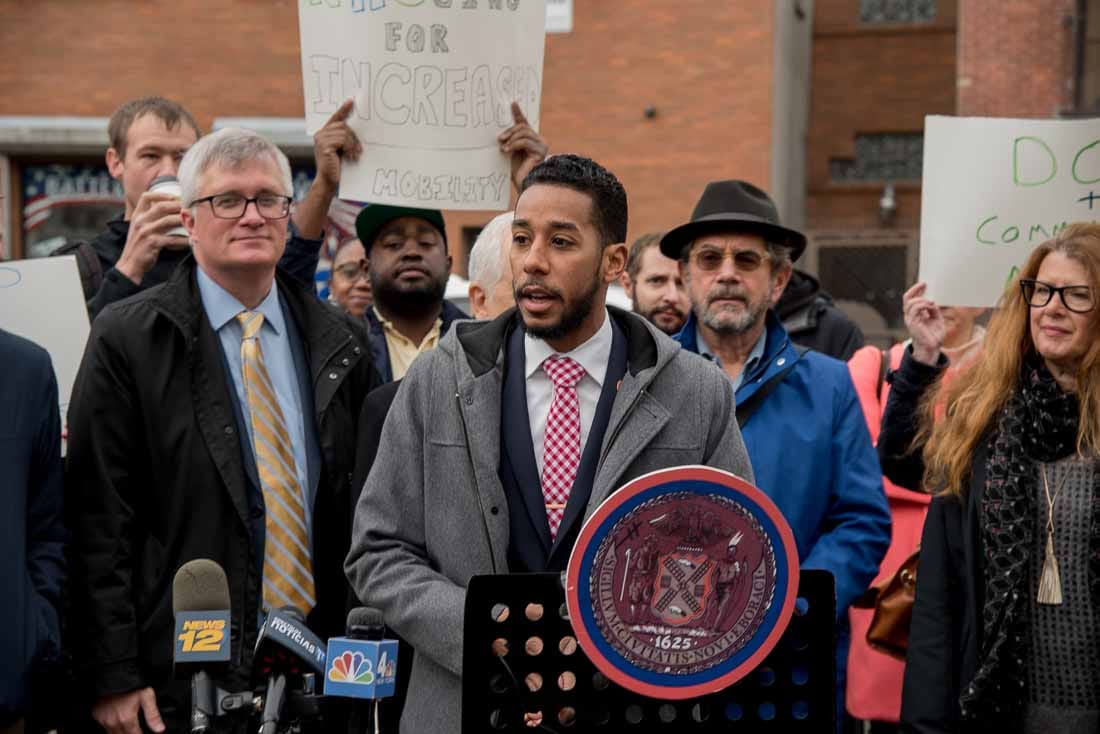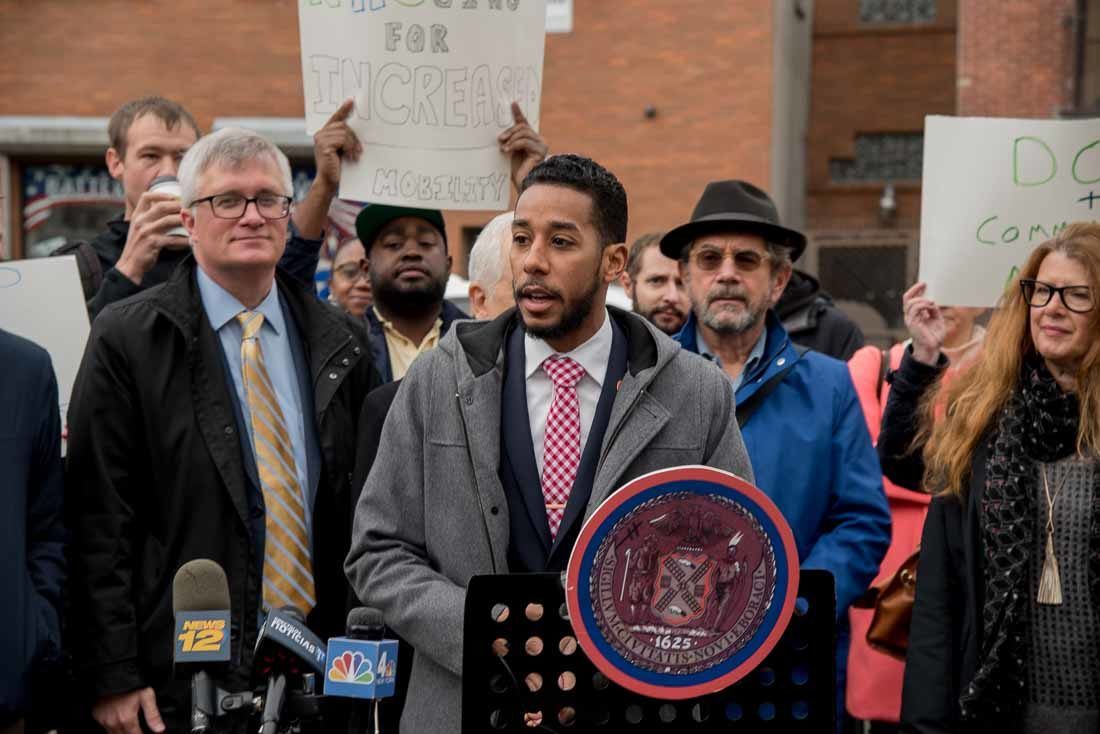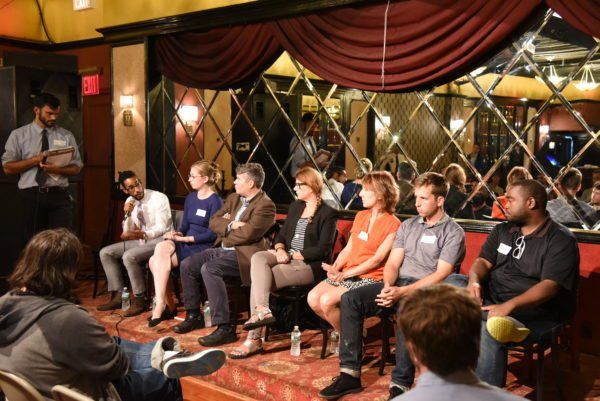Criminal Justice Reform, Transportation Plans and More: An Interview With Councilmember Antonio Reynoso

Upstairs in City Councilmember Antonio Reynoso’s Union Avenue office, staffers sat with constituents, conversing in Spanish, helping them with the day to day concerns of their lives. From one of their computers, a Drake track played quietly.
Another staff member popped in with a small Christmas tree to put up, and strings of lights were being unpacked. But when Councilmember Reynoso arrived, heading down the stairs to his basement office, he only had two things on his mind: criminal justice reform and a pot of coffee.
The new Council term starts on January, and current members are working to get legislation passed and legacy secured. Reynoso ran for re-election unopposed in the 34th District, and will represent Williamsburg, Bushwick and Ridgewood through 2021 for a second term. He’s eager to get things done.
Criminal justice reform, increasing affordable housing, and environmental justice and equity were Reynoso’s top issues in November elections.

“That’s the top priority right now,” he says of the Right to Know Act, a package of legislation that would require NYPD officers to inform citizens of their rights regarding consent to search and create a record of the interaction. Getting the Right to Know Act passed would be a major win.
The bill has been sitting in the Committee for Public Safety since 2015 and faces strong opposition from the Patrolman’s Benevolent Association. In a memo published by Politico, the group criticized the bill for both taking power away from the Police Commissioner—by legislating changes to the NYPD instead of recommending them—and for encouraging the public to question their interactions with the police.
Reynoso is confident a vote will come before the end of the year.
“That has consumed my life for the last three weeks, trying to tighten it up and make sure we’re done.”
Reynoso, a progressive who came up with the New Kings Democrats, favors bold moves, especially when it comes to environmental projects.
“Right now, as a city, we should be moving to put solar panels on all our public buildings. To reduce the carbon footprint and also the amount of dollars we’re spending on energy long-term,” he said. “We’ve got the capital dollars to do that.”
“When the mayor put out his plan for retrofitting those buildings, it’s like in the Year 3000 we’re gonna have it on six buildings. It’s not bold… Compared to how bold the mayor goes with housing, the environment is second fiddle.”
“It’s hard to make it a priority, I guess—it’s not a visible ‘killer’,” he said. “You don’t feel the effects immediately, either.”
Reynoso is also an original co-sponsor of Councilmember Stephen Levin’s (D-33) Intro 495 bill, which would cap the amount of trash moved through North Brooklyn’s waste transfer station. The bill aims to reduce dangerous truck traffic, air pollution and environmental effects associated with waste transfer, especially in North Brooklyn.
Earlier this year, the Mayor announced his support for the bill, and Reynoso says the Sanitation Commissioner is on board, too. Though critics have called the bill a job-killer, it’s disagreements between the Bronx and Queens that have held up the bill, says the Councilmember.
For the bill to get done before the end of the year, negotiations need to wrap up quickly.

And then there is the expected 15-month closure of the L train, slated to begin in April 2019 that will affect many of constituents in District 34. More than 220,000 commuters cross from Brooklyn into Manhattan on the train every day, and the closure will put a serious strain on already overburdened infrastructure.
Last week, the Councilmember joined other local lawmakers, business owners and transportation activists to call on the MTA and DOT to engage more with the community in planning for the closure.
“The L train is running at maximum—right now, they’re literally waiting for one to go out for the next one to come in and you’ve still gotta wait for three trains to get into one,” he said.
The Councilmember says the J, M and Z will need to speed up, from every five minutes to every three during the shutdown. He wants to see the short, four-car G train built out to a full complement of cars, running trains every four or even three minutes along the the crosstown line. While those trains may return to their current the seven-minute intervals after the L train is running again, he thinks the lengthening of the train should stay permanent.
But faster trains and ferries aren’t going to be enough. “We should have a permanent HOV lane on the Williamsburg Bridge,” he said. “While the shutdown happens, it should should be a bus-only lane.”
Looking at the shutdown as an opportunity to think radically and invest in infrastructure, Reynoso is a big proponent of new methods of transportation. He supports the DOT’s car-sharing pilot, which will put dedicated parking spots for car-sharing companies in North Brooklyn, and wants to see Citibike expand into Bushwick.
He’s even thrown his support behind the idea of a Grand Street “peopleway,” which would shut down the street to private vehicles, prioritizing pedestrians, bicyclists and mass transit. “I want the center to be a pedestrian plaza all way through from Union to Bushwick,” he said.
With the L train closure in the future and days of bill negotiations in the present, Reynoso has plenty of concerns to juggle. But he’s ready to carry the lessons from his first term into the next four years.
“Look, I’m still learning how to be a councilmember,” he said. “Four years in and you’re still learning.”
His biggest lesson? “When I have more passion, and I show my concerns emotionally, I saw things happen,” he said. “I’ve been an activist my whole life, I’ve been an organizer my whole life—I care.”



